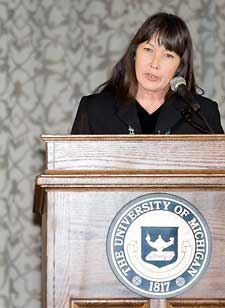
This web page is part of the Michigan Today Archive. To see this story in its original context, click here.
MLK Symposium Activist says eliminating Native mascots 'an issue of dignity'By Kevin BergquistWhen artist, writer and advocate Charlene Teters was a graduate student at the University of Illinois at Urbana-Champaign in the early 1990s, she found herself surrounded by images that made her feel uncomfortable and not welcome on campus.
A member of the Spokane Nation, Teters was recruited to the Midwest school to pursue a master of fine arts degree. When she arrived, Teters said false portrayals of Native Americans abounded, from a bar named Kams with the slogan, "Home of the Drinking Illini," to a sorority that held an annual "Miss Illini Squaw" contest. As much as those images offended her, the response from many on campus surprised Teters, who delivered the closing lecture of the MLK Symposium Jan. 30 in the Michigan Union Ballroom. "One professor said 'You can't do anything about it, so just keep your mouth shut and get your degree,'" recalled Teters, who earned an MFA in painting from Illinois in 1994. She is a professor of art at the Institute of American Indian Art in Santa Fe, N.M. "We went there with a great deal of hope; what we found was a community surrounded by these caricatures of Native people." Teters said the stereotypes continue today on the university's athletics fields. The Illinois athletics mascot is "The Fighting Illini," and football and basketball games feature a ceremonial halftime dance by "Chief Illiniwek"—a university student fully attired in Native American dress. Those images hit home when Teters and her children, Kristal and George, attended a UI basketball game at a time when Illinois was a national power in men's basketball, advancing to the 1989 Final Four. "We love sports; basketball is almost a sacred game to us," said Teters, a founding board member of the National Coalition on Racism in Sports and the Media. "That team was magical and my children wanted to see them play. But the actions of the fans were hard to take—the handclapping, face painting and wearing feathers." Teters said she knew then that she had to get involved. She held up a sign that read, "American Indians are human, not mascots." "When my children's self-identity became eroded, I had to get involved," she said, recounting how her phone rang for days afterwards. Most calls were harassing but several offered support and encouragement to stay involved in the issue. In 2005, the NCAA put UI on a list of 18 institutions cited for inappropriate use of mascots or images. The University on Jan. 31 appealed the NCAA decision that the Illinois mascot is "hostile and abusive" to Native Americans. The school does not consider Chief Illiniwek to be a mascot or a symbol, but rather a performer. Teters said eliminating Native American mascots is everyone's responsibility. "It is not a Native American issue," she says. "It is an issue of dignity." The fight continues at other schools, including Florida State University with its team nickname the Seminoles, where fans extend their arms in a "tomahawk chopping" motion during football games. "To Florida State and the University of Illinois, we are halftime entertainment," said Teters, whose challenge of the use of Native Americans as a mascot is the subject of the documentary, "In Whose Honor?" The film traces the Chief Illiniwek controversy into a national movement against Native American mascots in elementary schools to professional, multi-billion dollar sports enterprises. "But we are human beings; not mascots." Teters said this struggle has been going on for more than 50 years, and added that Native American people must know their history to understand why mascots such as Chief Illiniwek at her alma mater must be removed from public schools. "My experience at Illinois has forever changed me," she concluded. "For those that want to trivialize this issue—racism is not an issue. |
|
Michigan Today News-e is a monthly electronic publication for alumni and friends. |
| MToday NewsE | |
|
|
Michigan Today
online alumni magazine
University Record
faculty & staff newspaper
MGoBlue
athletics
News Service
U-M news
Photo Services
U-M photography
University of Michigan
gateway

